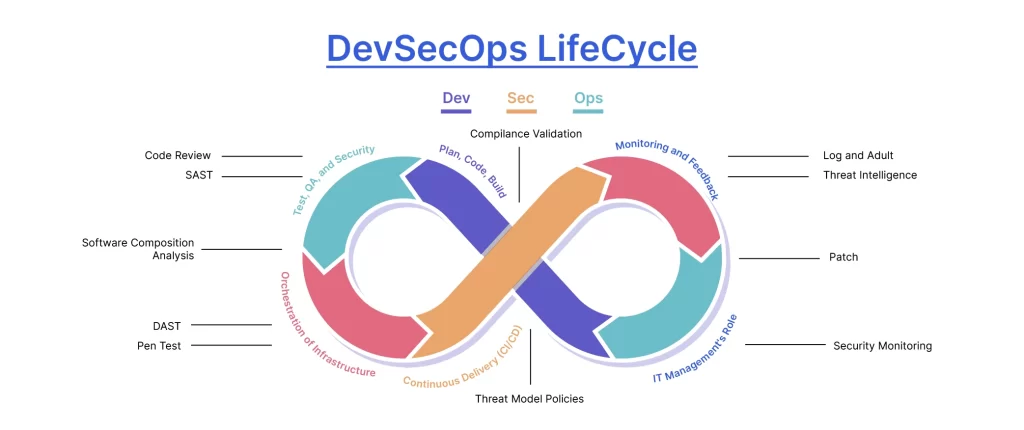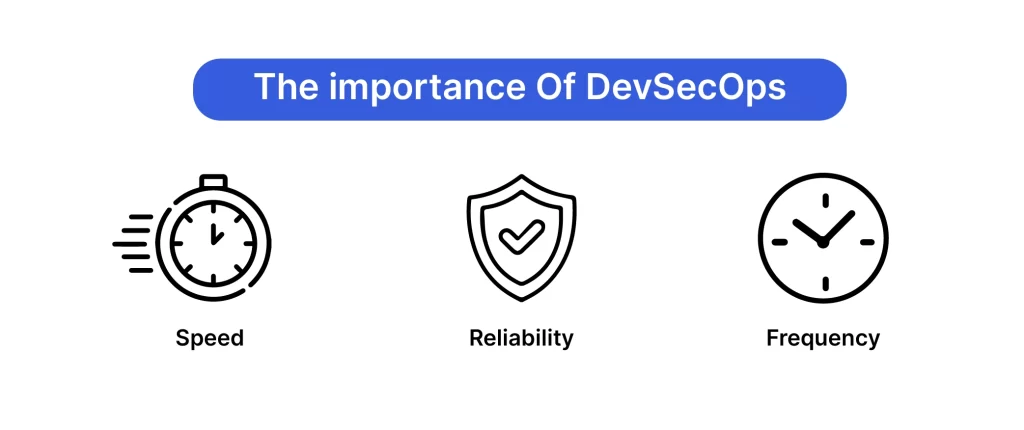When teams operate independently, it creates communication gaps that can lead to disorder. In contrast, when teams collaborate, they tend to be more efficient.
The IT industry is going through a major shift towards technology advancements and digitalization, with DevOps and cybersecurity being recognized as essential components. However, there are growing security concerns for organizations, as cyberattack often targets software development and deployment processes. To combat this, a new concept known as DevOps security or SecOps services has emerged, emphasizing security as a vital part of the development operations process.
In this article, we will delve into what DevOps security entails, its mechanism, its challenges, and why it is vital for IT companies. But before that, let’s get a short overview of what is DevOps.
DevOps is a collective set of practices and principles aimed at uniting software development and operations teams. It also helps enable them to work together to shorten development cycles and deliver high-quality software.
This is an approach that has become popular because it allows for frequent updates and bug fixes, as well as continuous integration (CI) and continuous delivery (CD).
By automating the build and delivery processes of applications, DevOps supports the deployment of multiple microservices in cloud-based and containerized environments.
In combination with cloud-based infrastructure, DevOps can auto-scale its processes to meet the demands of users, offering new computing resources, and deploying additional application instances as necessary.
DevOps is vulnerable to security breaches due to its increased number of automated processes, microservices architecture, containers, and a wide array of tools. DevOps security, or DevSecOps, is an extension of DevOps that focuses on making security a key component of the software development pipelines. It offers a secure development environment, defines security patterns, and automates security for processes.

Firstly, Devops security requires a holistic approach that goes beyond traditional security models and adapts to the unique challenges of the DevOps environment. However, the DevOps model introduces new capabilities but also poses unique security challenges that require special attention. Traditional security management tools may not be effective in addressing these challenges. Some of the key challenges include:
Security plays an essential role in the DevOps process, requiring teams to prioritize, collaborate and incorporate security measures into all stages of the software development life cycle.
It is essential to build a security-first culture that prioritizes security throughout the organization, including developers, operations, and management teams.
Advanced and latest automation tools for testing, scanning, and security compliance checks should be incorporated to ensure rapid identification and remediation of security vulnerabilities.
DevOps model depends heavily on APIs, which can be vulnerable to cyber-attacks. Ensuring API security is however critical to maintaining the overall security of the DevOps environment.
The dynamic nature of DevOps, where code is frequently being deployed and updated, requires robust identity and access management to prevent unauthorized access and data breaches.
Thus, DevSecOps, or DevOps security, is a critical aspect of software development in today’s digital landscape. The integration of security measures into the DevOps process ensures the rapid identification and remediation of security vulnerabilities, reduces the risk of cyber-attacks, and improves overall security posture.

DevSecOps is essential for IT companies looking to develop and deploy secure software in a rapidly evolving digital landscape. Let’s explore some of the key benefits;
DevOps Security combines security practices and processes into the DevOps pipeline to create a secure development environment.
Thus, DevOps Security provides a comprehensive approach to securing the DevOps pipeline, integrating security into every step of the software development lifecycle, and ensuring the rapid identification and remediation of security vulnerabilities.
IT companies should consider security measures as an integral part of the process because they will help them ensure the security of the software development lifecycle.
First, it is important to identify and address any potential vulnerabilities and security requirements within the development pipeline. Code repositories should also be secure by limiting the privilege concentration for building automation tools and adhering to the principle of least privilege.
Additionally, sensitive information such as passwords and keys should be stored in a secure vault and regularly rotated to mitigate the risk of exposure. To monitor activity and access to sensitive data, each machine should have a unique identifier and a baseline for normal behavior should be established to identify anomalies.
By implementing these measures, DevOps security can be effectively integrated into the software development lifecycle to ensure high security.
In today’s technology-driven digital world, the demand for fast and innovative software applications is growing rapidly. While the DevSecOps framework helps accelerate software development security and delivery, it often neglects best practices. However, with the increasing sophistication of cyber threats, companies cannot afford to ignore security in their software development lifecycle. DevOps security, or DevSecOps, is crucial for ensuring that software is developed and delivered with robust security mechanisms in place.
At IntellicoWorks, we understand the importance of secure software development and the need for DevSecOps. Our team of experts can help you implement DevSecOps practices to enhance the security of your software applications.
If you need any assistance with securing your DevOps team or conducting a security check of your DevOps methods, feel free to contact us.

Talk to us and let’s build something great together
A Subsidiary of Vaival Technologies, LLC
IntelliCoworks is a leading DevOps, SecOps and DataOps service provider and specializes in delivering tailored solutions using the latest technologies to serve various industries. Our DevOps engineers help companies with the endless process of securing both data and operations.
Ops
Cloud
AI & ML
Copyrights © 2023 byIntellicoworks. All rights reserved.